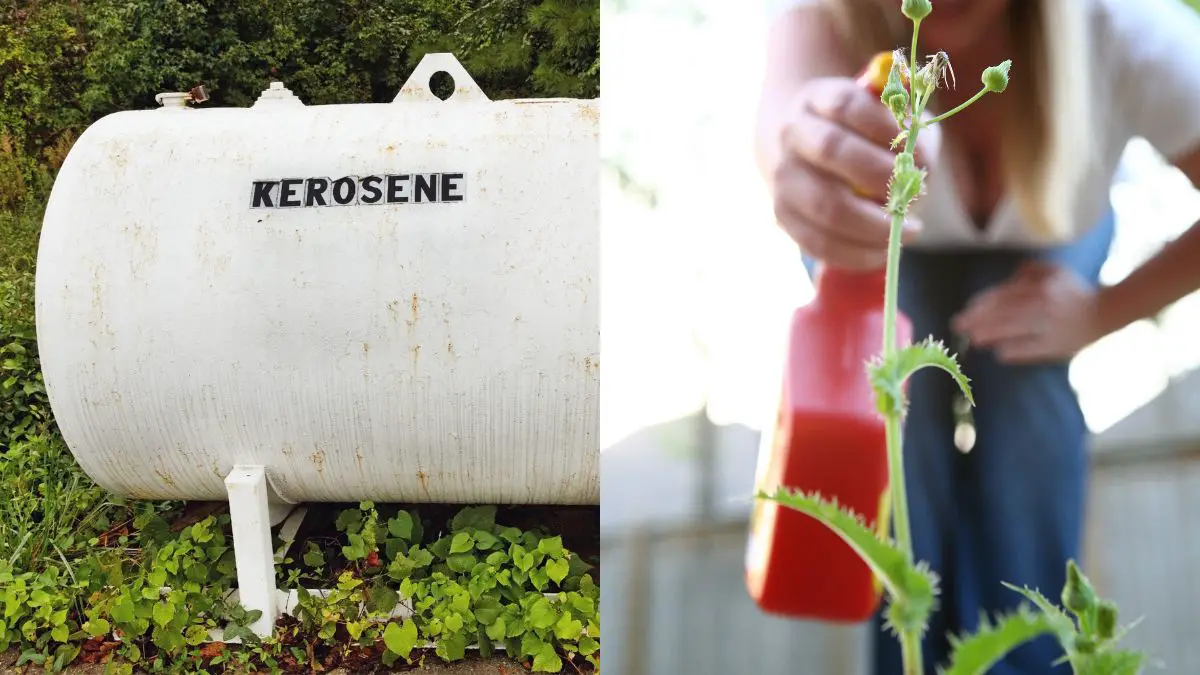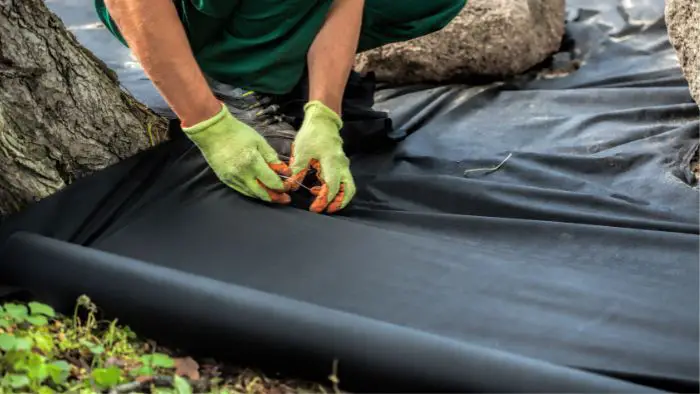Last Updated on March 20, 2023 by Cristina
Will kerosene kill weeds? Yes. Will a nuclear bomb cremate humans? Yes. Both are however unacceptable ways of solving a problem. The consequences of incredibly stupid actions impact other human beings and the life forms with which we share the planet. Killing weeds with kerosene is illegal, irresponsible, and actually just downright silly. Let’s unpack why and look at some alternatives that are safer.
Do Not Trust Internet Knowledge Blindly
A quick search of the internet on “will kerosene kill weeds” brings up hundreds of pages where people blindly parrot somebody else’s article on “how to kill weeds with kerosene”. This is an example of how the internet corrupts knowledge – people are being paid to write search engine optimized articles on “how to do this” or “that” and basically when they receive a topic, they are expected to just “write an article” to answer the question. Typically the writers are marginally educated in their field, and just want their few dollars in pay so they can move on to the next article. This is providing us with increasingly “useless” information on the internet where people actually spread dangerous information. I do not write such articles.
What Is Kerosene?
In the 1800s, we used whale and vegetable oil mainly for lighting. This was very expensive, and consequently, lighting was expensive. Kerosene was “discovered” by a Canadian, and gradually the methods of production first from coal, and then from petroleum spread globally. The visionary and ruthless John D. Rockefeller really drove the expansion of kerosene production, leading to the formation of many of the oil companies we know and love/hate today. One of the “useless byproducts” of kerosene production was gasoline, which, once we found a use for it, changed our world as well.
Summary – kerosine is a petroleum oil product, and it is not highly volatile – ie it does not evaporate fast.
Why Is The Discharge Of Oil Into The Environment Governed By Laws?
Oil products such as kerosene, have the potential to contaminate groundwater and rivers/lakes leading to damage to life. Hence if you spill kerosene on the soil, as you would do if using it to kill weeds, this exposes you to significant legal and ethical liability. Contaminating groundwater can be quite problematic as demonstrated here.
Laws such as this one, show that anybody who discharges oil into the environment (without burning it as was intended) is liable for the complete clean-up costs. This can amount to millions of dollars and or jail time.
CONCLUSION: DO NOT EVEN THINK ABOUT USING KEROSENE TO KILL WEEDS
Simple Alternatives To Using Kerosene To Kill Weeds
Caustic Soda/Caustic Potash
I prefer caustic potash as it is a bit less aggressive than caustic soda. This kills weeds in a very simple way -the concentrated caustic solution turns the waxes on the surface of the plant leaf into soap. This means that the plant dries out! It also dissolves the plant, so that is something to consider. After a day or two, residual caustic elements react with carbon dioxide in the atmosphere and become bicarbonate of soda or potash. The second reason I like to use caustic potash is that the potassium becomes a fertilizer in this way!
Learn more about Baking Soda Kill Weeds & Surprising Ways That Help You Fix This Horrific Problem
How To Mix A Caustic Weed Killer
Buy food-grade potassium hydroxide such as this. You do not want to buy industrial grade – chemicals often say 95% pure – the 5% is what you worry about. The industrial-grade could be 95% potassium hydroxide, but there may be lead or arsenic in the 5%, which we do not want in our lives. Food-grade chemicals have “safe” impurities.
Buy some decent protective gloves such as these and protective goggles such as these. You will note the goggles I recommend, have a little ridge around the bottom and top that protects against splashes getting under or over the goggles. Hydroxide and eyes are just a bad combination. When you work with hydroxide always have a bucket of clean water nearby to wash any splashes that get on you quickly. Diluting hydroxide reduces its aggressiveness.
Mix one part potassium hydroxide into three parts water. Do this in an open bucket – the solution may get so hot that it boils. Stir with a wooden pole. Once it is dissolved and has cooled down, put it into a sprayer such as this one that has no metal parts.
How To Apply Caustic Potash As A Weed Killer
You can then spray your weeds and grass verges etc with the liquid. I spray until the plants are surface wet. They die within a few days. Ideally, do this when you have a few days of hot dry weather on its way. There is no point spraying caustic potash in the rain – it will just get diluted and have little effect.
Empty your sprayer when you are finished. You can put the leftover caustic solution in your toilet bowl, or drains – it will help to clean grease and gunk out of the system. Rinse the sprayer – well. The little gaskets in these cheaper units tend to go soggy when exposed to caustic solutions. This renders the sprayer non-functional. If you wash the systems out you will get two or three years out of it, which for US$15 is not a bad run. I find the more expensive units tend to have more metal parts – and metal parts and caustic potash are not good friends. Buy cheaper plastic units and save money!!
Do not spray caustic solutions on paint or aluminum. It will dissolve these. This naturally means “move your automobile”.
When applying the solution – wear your goggles and old clothes. Caustic soda wind spray does not penetrate clothes, but often when you wash your clothes later you get little holes appearing.
Vinegar As A Weed Killer
I have tried this once or twice. Vinegar does kill weeds – it temporarily changes the soil pH and kills the plants. Something about this seems dangerous to me – low pH in soils leads to heavy metal leaching. Heavy metals are just not good. We don’t need them in our lives.
People advocate using vinegar as it is “natural”. I know it works – I make vinegar on an industrial scale and consult with companies that make thousands of tons of vinegar a year. I know it kills plants, and I know it can be used as a “natural insecticide”. This does not however mean that it is an ideal system. I would stay away from using it.
Black Sheeting
I have found over the years that black plastic sheeting can be effective to kill tough grasses and some weeds. Just roll the sheet over the surface and anchor it down on the edges with bricks. The Sun will heat the sheets up, and the plants below will be cooked. It also stops all light and this helps too. Naturally, this works when it is hot – it will be of limited efficacy when covered by snow in winter. This is a really neat, clean, non-chemical method of cleaning out your soil. There is a small risk of certain chemicals leaching out of the plastic, but other than that, it is pretty environmentally friendly.
Mulch
A mulch layer is nature’s own weed suppression system. This is what fallen leaves are for!!
This bed of radishes was planted two months ago, and I have not applied mulch. As you can see it is full of weeds. Luckily this weed is actually really tasty so I left it – the radishes were poor seed and did not germinate well hence the weeds were actually a bonus.
This bed was planted at exactly the same time – I mulched the soil first with oak and other deciduous leaves and lawn grass. The mulch layer was 6 inches thick. I planted the seedlings through the mulch and there are nearly no weeds at all. The mulch promotes earthworms, soil water retention, and soil fungi, and in winter, it helps to keep the roots warm.
Will kerosene kill weeds? Yes. Should you use it? No. I have provided alternatives for you to use that are better, cleaner, and safer. Follow the above safety instructions for caustic use, and you should be able to manage your weeds and problem grasses effectively. These methods kill all plants! They are not selective. So do not expect to spray your flower patch with caustic soda and just kill weeds. A general rule in life is weeds die last! If you enjoyed this, please share.
FAQs
What will happen to plants if you spray with kerosene?
Kerosene will kill weeds. It will also contaminate groundwater. Consequenly, the use of kerosene to kill weeds exposes you to legal liability, potential fines and or jail time.
What is the fastest way to kill weeds?
I like to use kaustic potash to kill difficult weeds such as invasive grasses. All other weeds can be killed with a mulch. A 1 part caustic potash to 3 parts water solution, combined with your use of eye and skin protection, can be applied to weeds. This kills them in two to three days.
What kills weeds permanently but not grass?
There are selective herbicides that will kill weeds but not grass. I find that all of these have compounds in them that are quite questionable in terms of their long term safety. All of these chemical herbicides marketed by big companies follow the same route - they come out and are marketed as being safer than water - as the patents reach the end of their lifetimes, the investors have recouped their investment, and then it is found that these things cause cancer etc, the product gets banned and a new one that is patent protected gets released. Rather just use natural methods such as caustic potash, black plastic or even fire to partially sterilize your soil. Then plant your lawn again.
What household product kills weeds permanently?
Caustic soda or potash kills weeds permanently and then degrades into relatively harmless compounds after a few days. Try and use food grade caustic products - these compounds are generally 95% pure - with food grade compounds the other 5% of impurities are not toxic. With industrial grades they can contain lead, arsenic and cadmium - moities you do not wish to have in your life.
Dr. Garth A. Cambray is a Canadian/South African entrepreneur and beekeeper with 28 years of experience in apiculture and specializes in adding value to honey. His Ph.D. research developed a new advanced continuous fermentation method for making mead that has resulted in a number of companies globally being able to access markets for mead. His company, Makana Meadery, exports honey mead to the USA where it is available to discerning connoisseurs. He has also developed technologies to commercially manufacture organic honey vinegar in Zambia for export globally. He holds a few patents globally in the ethanol industry and believes in technology and knowledge transfer for human development and environmental sustainability. One of his proudest achievements is the fact that the wind farm he started at one of his old apiary sites has essentially made his hometown carbon neutral.





